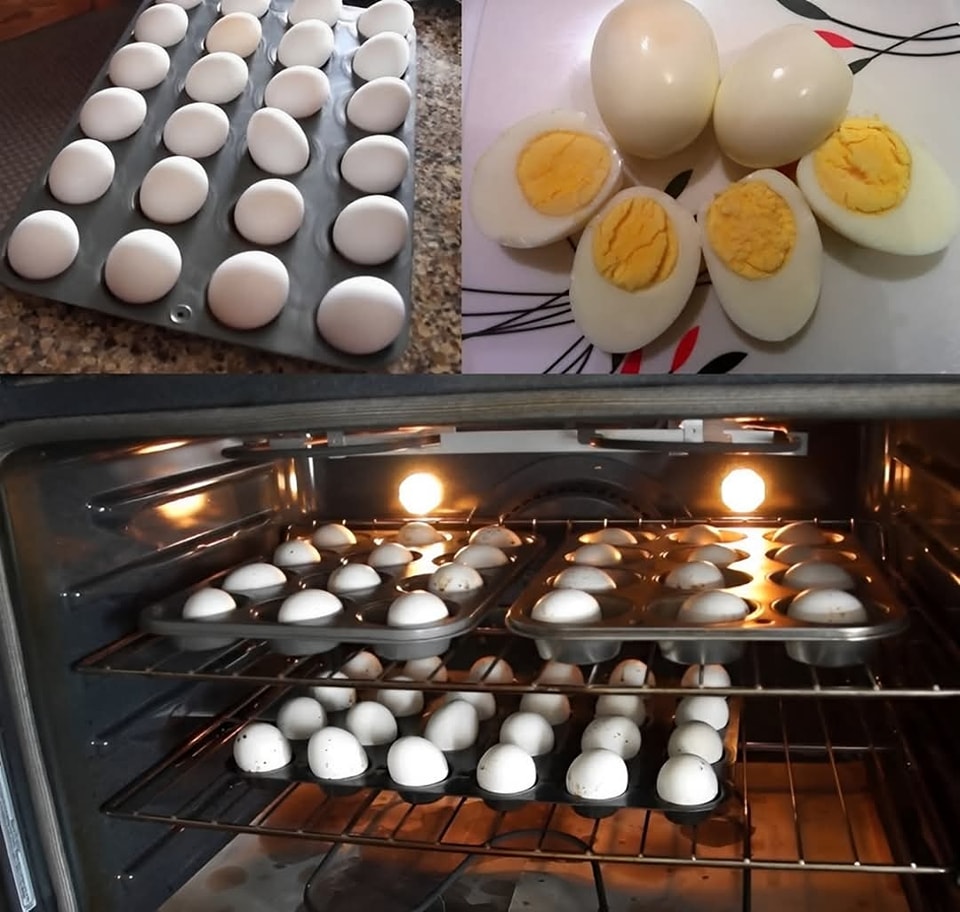If you’ve ever boiled eggs, chances are you’ve also dealt with cracked shells, stubborn peels, or pots of water boiling over because you got distracted. I’ve been there, watching yolks turn green and peeling eggs so frustratingly that I wanted to give up breakfast altogether. That’s why when I first heard you could “hard-boil” eggs in the oven, I thought, “Really?

That sounds ridiculous.” But curiosity got the better of me, and since I’m always down for a shortcut in the kitchen, I decided to try it. Surprisingly, it works—but is it better than the classic stovetop method? That’s up to you. The oven method is shockingly simple. If you’ve never tried it, don’t worry—it’s not complicated at all. You don’t need to boil water or stand around waiting with a timer. All you need are eggs, a muffin tin or baking dish, and a bowl of ice water. You start by preheating your oven to around 325°F to 350°F—keep in mind that oven temperatures can vary, so there might be some trial and error. Place each egg in a muffin tin slot so they don’t roll around, or place them directly on the oven rack if you’re feeling brave (just be cautious—they wobble). Bake for 25 to 30 minutes, then move the eggs immediately into an ice water bath for 5 to 10 minutes.
This step is crucial because it stops the cooking process and helps make peeling easier. Once they’re cool, peel and eat them, or store them in the fridge—unpeeled eggs will stay fresh for up to a week, while peeled ones are best eaten within three to four days. So what are the actual pros and cons of baking eggs instead of boiling them? The benefits are solid. First, you don’t have to hover over a pot. You can pop them in the oven and walk away—no risk of boiling water overflowing or scorching your stovetop. It’s also great for making large batches; if you’re prepping lunches or deviled eggs, this method is a huge time-saver. Some people even claim the eggs peel more easily, and there’s less chance of cracking from aggressive boiling. But there are downsides, too. Baking takes longer—25 to 30 minutes compared to about 10 to 12 minutes on the stove. Depending on your oven, some eggs might cook unevenly, leaving you with a few that are overdone while others are too soft. You might also notice brown spots on the shells, which are harmless but not pretty.
And if you overdo it, the texture can turn rubbery. Another issue is the dreaded green ring around the yolk, caused by a chemical reaction between the egg white’s sulfur and the yolk’s iron. It’s harmless, but not appetizing, and usually happens when eggs are overcooked. Taste-wise, oven-baked eggs are just a little different. The whites can feel firmer, and the yolks might be slightly drier than their boiled counterparts—especially if you overshoot the cooking time.
But the difference is subtle, and if you’re not picky, you probably won’t mind. When it comes to peeling, the age of the egg matters more than the cooking method. Older eggs, whether baked or boiled, are easier to peel. I’ve had days where the shell practically slides off and others where I’m picking it off in microscopic pieces. Some people use tricks like shaking the eggs in a container to loosen the shells, which can help. But again, it’s not so much about baking vs. boiling—it’s about how fresh your eggs are. So should you give oven-baked eggs a shot? That depends on your priorities. If you want a hands-off method and you’re cooking a big batch, go for it. If you’re in a rush or aiming for consistency and perfect texture, the stovetop is still your best bet. Personally, I still lean toward boiling because it’s faster and more reliable for small batches. But if I ever need to prep a mountain of eggs at once, you better believe I’ll be using the oven. In the end, both methods get the job done—it’s just a matter of what works best for your lifestyle.





